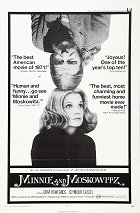Directed by:
John CassavetesScreenplay:
John CassavetesCast:
Gena Rowlands, Seymour Cassel, Val Avery, John Cassavetes, Xan Cassavetes, Zoe R. Cassavetes, Judith Roberts, Roberta Collins, Timothy Carey, Darlene Conley (more)Plots(1)
Moskowitz (Seymour Cassel) is a nutty parking lot attendant who decides to head for California. Minnie (Gena Rowlands) is a museum curator whose relationship with a married man hits a dead end, thereby forcing her back into the dating world. When Moskowitz protects Minnie from a desperate suitor, a relationship forms that is at first raucous and bitter; eventually, however, the pair begins to realize that their differences pale in comparison to their inexplicable need to be together. After a vicious argument, they decide to give in and attempt a genuine partnership. (Anchor Bay Entertainment)
(more)Reviews (1)
The saying that all roads lead to Rome is just a self-deception of humanity believing in fate, through which it removes responsibility for its own tragicomical wretchedness - in fact, Cassavetes showed that there is only one way, leading to countless different goals. Similarly, Cassavetes can use the same cinematic language, the same artistic approach, and the same general relationship to life and the world, no matter what subject he films: he just needs to change the accent, emphasize a certain detail at the expense of another, add a touch of slapstick, and suddenly we have a comedy out of a drama. The viewer can momentarily forget that, on the contrary, his dramas have in the description of human dignified wretchedness their colossally ironic and funny dimension. No human journey ever leaves the dual tragicomedy of its one life path: staggering between the two poles of Kantian unfriendly sociability; denying the fact that a person can find happiness only in the bosom of others, which they continue to destroy and then can't help but wonder why they are alone among people and people are in the middle of them in their isolation... the path of words, the only path of words, which are constantly launched harpoons, with which we try to defeat the other person like a whale in a single gesture, while at the same time attaching them to ourselves. Words, always the same words, which are tragic once when Cassavetes lets a lonely character utter them in a filthy dump, and comical another time when, like here, he lets them scream at each other as characters of fateful lovers.
()

